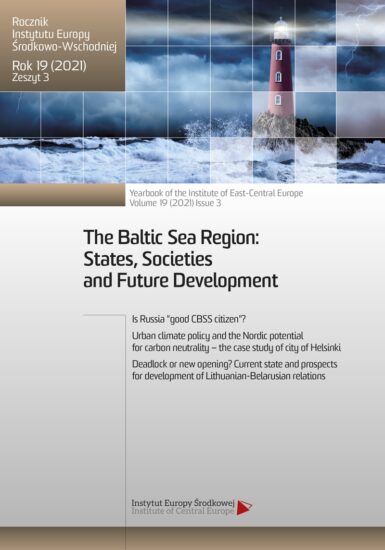ORCID: Marta Szulc: 0000-0002-9928-305X
Afiliacja: Uniwersytet Szczeciński
Pages: 101-119
Edition: Lublin 2021
DOI: https://doi.org/10.36874/RIESW.2021.3.5
Citation method: M. Szulc, Youth policy in the Baltic Sea Region – a case study of Lithuanian, Latvian, Estonian, and Polish youth participation in the BSSSC Working Group on Youth Policy, „Rocznik Instytutu Europy Środkowo-Wschodniej” 19(2021), z. 3, s. 101-119, doi: https://doi.org/10.36874/RIESW.2021.3.5.
Keywords: Baltic Sea region, BSSSC, Estonia, Latvia, Lithuania, Poland, Youth cooperation, Youth Policy
Abstract: Youth policy, understood as youth activity and policy for youth,has been developing in the Baltic Sea region for many years. It takes placeon many levels of Baltic cooperation; therefore, this article uses the theory ofmulti-level governance for the analysis. There are some differences in youthpolicy between the communities of the Baltic Sea Region countries. This articleaims to analyse the participation of young people from the regions ofLithuania, Latvia, Poland, and Estonia in the BSR youth policy, based on theexample of the Youth Working Group of the “Baltic Sea States SubregionalCo-operation”. The main part of the article is an analysis of interviews withyouth coordinators of “Baltic Sea States Subregional Co-operation” from selectedcountries. During the study, 5 interviews were conducted, and, thanksto these interviews, the author has made interesting observations on the differencesin involvement of young people from Lithuania, Latvia, Estonia, andPoland. They indicated, inter alia, disproportional access to participation in thework of the Youth Working Group “Baltic Sea States Subregional Co-operation”between Estonia and Poland, and Lithuania and Latvia. The results clearlyshow that young people from Polish regions have the greatest opportunitiesto shape youth policy in the Baltic Sea Region.
Bibliography:
BSSSC Resolution, 1994-2019, www.bsssc.com.
Chodubski A., Młodzież jako przedmiot i podmiot życia publicznego [in:] Polityka młodzieżowa Unii Europejskiej, M. Boryń, B. Duraj, S. Mrozowska (eds.), Toruń 2014.
Cohesion Policy and European Integration: Building Multi level Governance, Hooghe L. (ed.), Oxford 1996.
The Commonwealth, Global Youth Development Index and Report, 2016, http://cmydiprod.uksouth.cloudapp.azure.com/sites/default/files/2016-10/2016%20Global%20Youth%20Development%20Index%20and%20Report.pdf.
Czapiewski T., The Advocacy Coalition Framework after a Quarter of a Century. Explaining the Policy Process, “Athenaeum” 2013, no. 40, pp. 47-59.
Erasmus +, https://ec.europa.eu/programmes/erasmus-plus/opportunities/individuals/young-people/youth-exchanges_pl.
European Commission, European Commission white paper – A new impetus for European youth, COM/2001/0681 final.
European Commission, European Governance – white paper, COM (2001) 428, 2001.
European Youth Pact, 2005, https://eur-lex.europa.eu/legal-content/EN/TXT/HTML/?uri=LEGISSUM:c11081&from=EL.
Gänzle S., The European Union’s Strategy for the Baltic Sea Region (EUSBSR): improving multilevel governance in Baltic Sea cooperation?, “Journal of Baltic Studies” 2017, vol. 48, no. 4, doi: 10.1080/01629778.2017.1305205.
Gänzle S., Experimental Union’ and Baltic Sea cooperation: the case of the European Union’s Strategy for the Baltic Sea Region (EUSBSR), “Regional Studies, Regional Science” 2018, vol. 5, no. 1, pp. 339-352, doi: 10.1080/21681376.2018.1532315.
Gomółka K., Borucińska I., Civinskas R., Sasys R., Civic participation of young people in the South Baltic region. The example of Lithuania, Poland and Sweden, Gdańsk 2020.
Hooghe L., Marks G., Multi-level governance and European Integration, Lanham 2001.
Hooghe L., Marks G., Blank K., European Integration since the 80: State-Centric v. Multi-level Governance, “Journal of Common of Market Studies” 1996, vol. 34, no. 3.
Kapaciauskaite I., Environmental governance in the Baltic Sea Region and the role of non-governmental actors, “Procedia Social and Behavioral Sciences” 2011, vol. 14, pp. 90-100.
Kern K., Loffelsend T., Sustainable development in the Baltic sea region. Governance beyond the nation state, “Local Environment: The International Journal of Justice and Sustainability” 2004, vol. 9, no. 5, pp. 451-467, doi:10.1080/1354983042000255351.
Kern K., Governance for Sustainable Development in the Baltic Sea Region, “Journal of Baltic Studies” 2011, vol. 42, no. 1, pp. 21-35, doi:10.1080/01629778.2011.538517.
Młodzi o polityce młodzieżowej w regionie Morza Bałtyckiego. Dokumentacja projektu “Krok ku demokracji”, Szczecin 2009.
Pospieszna P., Galus A., Promoting active youth: evidence from Polish NGO’s civic education programme in Eastern Europe, “Journal of International Relations and Development” 2018, doi: 10.1057/s41268-018-0134-4.
Ruszkowski J., Ponadnarodowość w systemie politycznym Unii Europejskiej, Warszawa 2010.
Ruszkowski J., Teorie specjalistyczne w studiach europejskich [in:] Teorie w studiach europejskich, J. Ruszkowski, L. Wojnicz (eds.), Szczecin–Warszawa 2012.
Sabatier P.A., The advocacy coalition framework: revisions and relevance for Europe, “Journal of European Public Policy” 1998, vol. 5, no. 1, pp. 98-130.
Scott J., Cross-border Governance in the Baltic Sea Region, “Regional & Federal Studies” 2002, vol. 12, no. 4, pp. 135-153, doi: 10.1080/714004777.
Sińczuch M., Polityka młodzieżowa jako odrębny obszar działania Unii Europejskiej [in:] Polityka młodzieżowa, G. Zielińska (ed.), “Studia BAS” 2009, vol. 2, no. 18.
Solidarity Corp, https://europa.eu/youth/solidarity_pl.
Szulc M., Polityka Unii Europejskiej wobec Regionu Morza Bałtyckiego.
Podejście makroregionalne i wielopoziomowe, Toruń 2019.
Szulc M., The Regional Cooperation in Europe. From the Madrid Convention to the Macro-Regional Approach, “Zeszyty Naukowe Uniwersytetu Szczecińskiego ACTA POLITICA” 2015, vol. 31, pp. 45-58.
Szulc M., Współpraca subregionalna w regionie Morza Bałtyckiego na przykładzie Konferencji Współpracy Subregionalnej państw Morza Bałtyckiego, “Gdańskie Studia Międzynarodowe” 2014, vol. 12, no. 1-2, pp. 122-135.
Tomaszewski K., Unia Europejska w poszukiwaniu skutecznego mechanizmu zarządzania. Analiza krytyczna modelu teoretycznego multi-level governance, Toruń 2013.
Valman M., Beliefs and behavior in international policy making: Explanations to longitudinal changes in the governance of the Baltic Sea, “Maritime Studies” 2016, vol. 15, no. 1.
Woodman D., Wyn J., Youth Policy and Generations: Why Youth Policy Needs to ‘Rethink Youth’, “Social Policy and Society” 2013, vol. 12, pp. 265-275 doi:10.1017/S1474746412000589.

PDF: Download